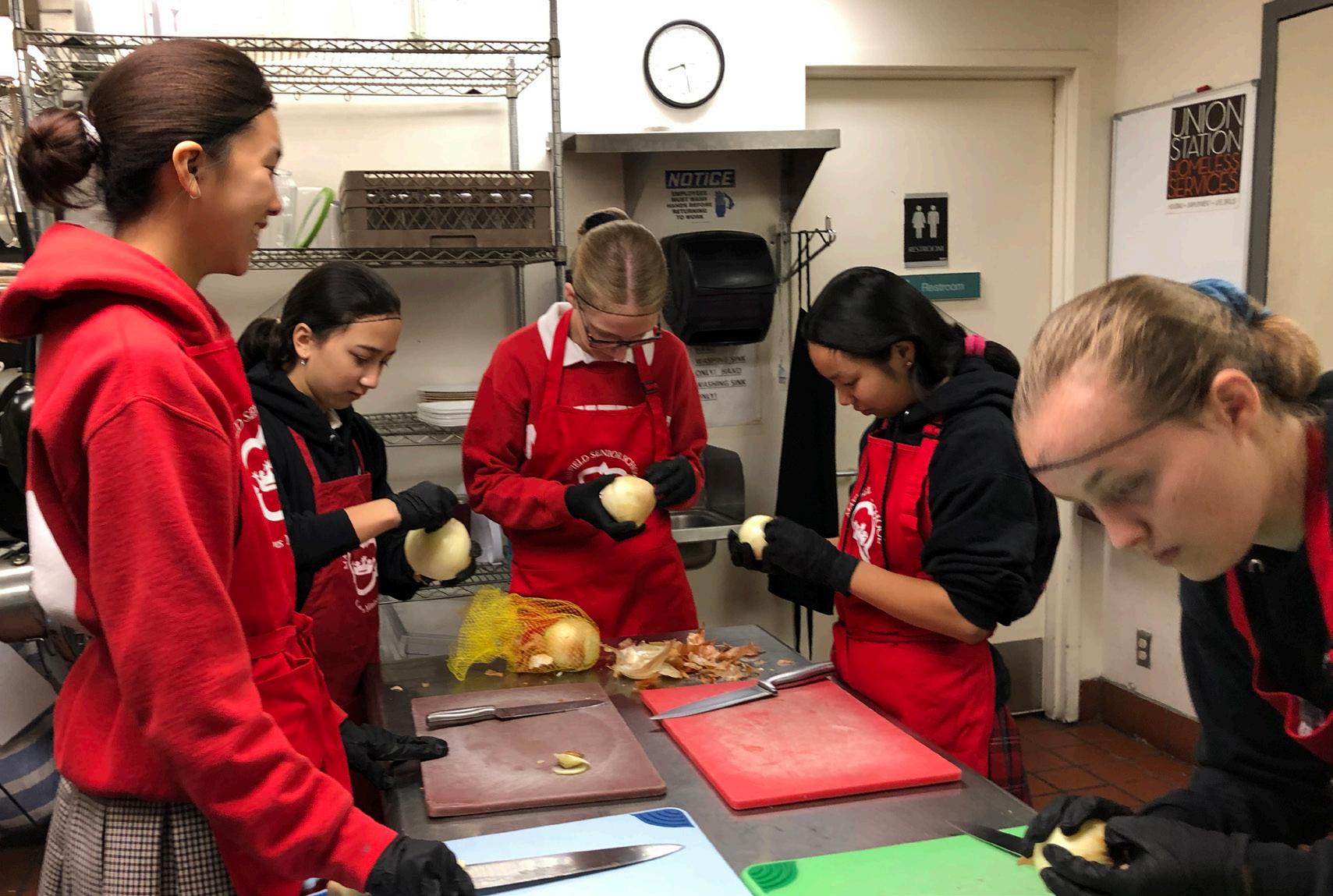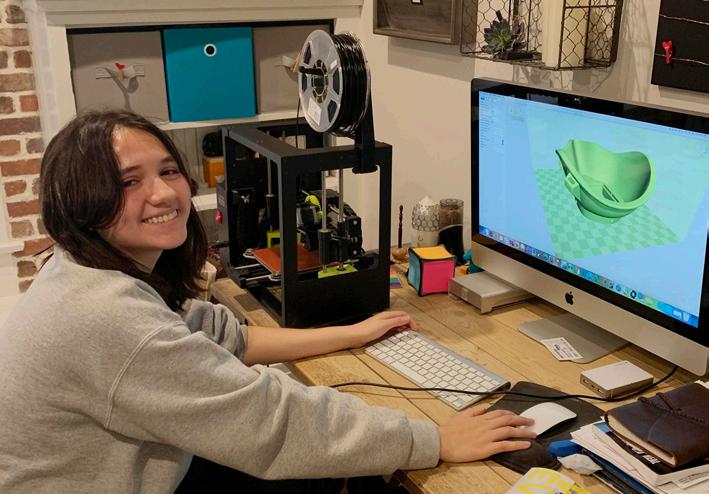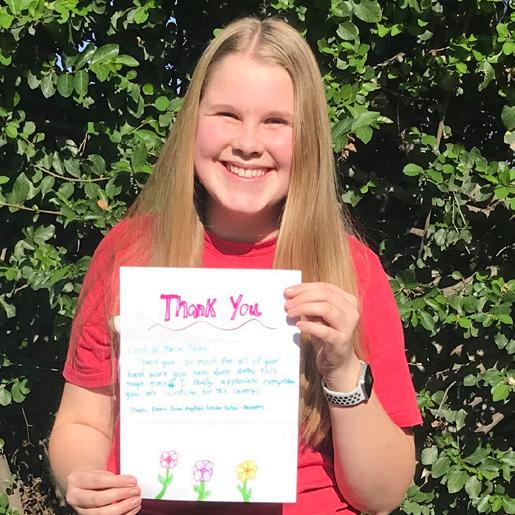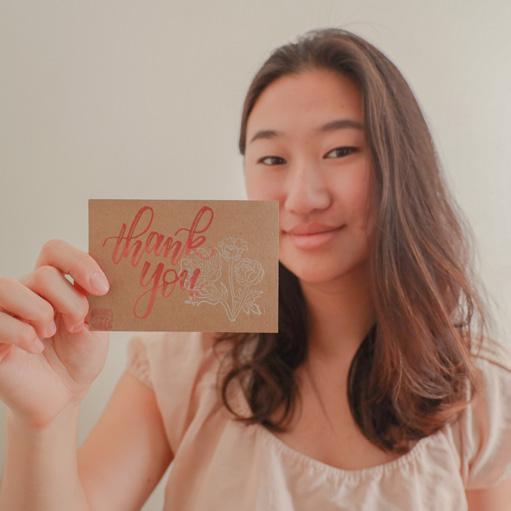
5 minute read
Service Learning Program Translates Theology Lessons Into “A Love Full of Action”
Mayfield students are getting up early, working through their free blocks, and giving from the heart to serve those who need it most.
It’s 7:00 a.m., and a group of 16-year-olds in distinctive red Mayfield aprons and hairnets are at work in the kitchen at Union Station Homeless Services in Pasadena. Their classmates move through the dining room, serving meals, bussing tables and chatting with guests. This is 11th-grade theology class.
Advertisement
In any given week, dozens of Mayfield students are working in the community as teenage epitomes of our “Actions Not Words” motto. Some serve breakfast to people living in poverty, some work on art projects with intellectually disabled kids, and others make time to talk with local nursing home residents. Some even add more before-school, free-block and weekend service sessions to their calendars.
This renewed commitment to regular, in-person service has been steadily ramping up over the past few years. And it begins before students even step into the classroom. In 2016, Head of School Kate Morin introduced a freshman service activity that immerses our newest Cubs in the central Holy Child tenet of action-based love. Our incoming ninth graders spend a morning at the Los Angeles Regional Food Bank, where they typically pack around 1,800 bags of food in just a few hours.
Mrs. Morin’s intentional roll-out of a new integrated service learning curriculum is designed not only to cultivate compassion, but also to build confidence. “Service, when it’s hard, teaches you that you can do hard stuff,” she said. Embedding these opportunities into the curriculum synthesizes theological theory, Catholic social teachings, and justice, diversity, equity and inclusion issues into a transformational, hands-on learning experience.
“Service to others helps students learn experientially about themselves, their communities and society,” said Director of Campus Ministry Teri Gonzales. “In this way, they are able to search and find meaning and purpose.”
The new three-phase service learning program, which was piloted last year, allows students to prepare, serve and reflect together as a class so they are able to grasp the needs of the vulnerable in our community—and the need to take action—with open hearts and minds. In the classroom, theology teachers help students understand who they will be serving, why these people need support, and what the challenges might be.
They look at how service fits into the context of what we believe, from our Holy Child values and goals to traditional sources, like scripture. Theology Department Chair Nora Warren starts with the basics: the Book of Genesis, and what she calls the “triple truths of the creation stories”— all that God has created is good; we are interdependent and made for relationship; we are called to be stewards of the earth.
Then, as students and their teachers work alongside each other, the personto-person connections they develop help break down biases and reinforce the grade-specific themes they’re studying in their theology classrooms. Freshmen focus on compassion through their work with developmentally disabled children at Villa Esperanza. Tenth-graders work on empathy as they befriend the residents at places like Scholl Canyon Retirement Center. Junior students explore the concept of mercy by serving people experiencing homelessness and poverty at the St. Francis Center and Union Station Homeless Services in Pasadena. And 12th-graders celebrate hope as they discover ways to use their strengths and passions to support causes that feel especially meaningful to them. In this way, they can carry this commitment far beyond their graduation.
“Our hope is that students will understand social justice today as the result of our collective vision and work toward restoring that sense of interconnectedness, harmony, love, and peace to the world that God intends for us all,” said Mrs. Warren.
Afterwards, students examine their experiences by talking them through in class, writing personal reflections and sometimes making videos. Challenge is built into the program, but so is the ability to express discomfort, and analyze it with humility and determination.
“One man came to our table and he seemed tall and intimidating,” said Michaela Sinclair ’21, after an early visit to the St. Francis Center. “But when he reached our table he turned and said ‘But first, coffee!’ with a smile on his face.”
Carol Fitzsimmons, Assistant Director of Campus Ministry, says that this idea of “relationality,” which she describes as “less ‘I’ and more ‘us,’ ” is the foundation of Mayfield’s expanded service learning initiative. “Instead of students ‘othering’ those around them, they get into the forever habit of seeing themselves in relationship to other members of this human family,” Ms. Fitzsimmons said.
— MEGAN SPENSIERO ’21
Although all service can enrich the human spirit, the “see, judge, act” model, also known as the “pastoral spiral,” gives young minds the blueprint to embrace something new and difficult, and to discover something important about themselves and the world in the process. It helps build self-esteem with a well-earned sense of integrity. It makes growth inevitable.
As one junior student concluded, “Service reminds us that the privileged and less fortunate do not live in two different worlds. Service reminds us that we are all human, all one family, and all here, in this one world, to help one another.” THE seven themes of Catholic Social Teaching As a Catholic community, we draw on these tenets, and our Holy Child Goals, in living out our “Actions Not Words” motto.

Students work in the kitchen at Union Station Homeless Services
...........................................................................
The Seven Themes of Catholic Social Teaching
As a Catholic community, we draw on these tenets, and our Holy Child Goals, in living out our “Actions Not Words” motto.
Life and Dignity of the Human Person
Human life is sacred and the dignity of the human person is the foundation of a moral vision for society.
Call to Family, Community and Participation
How we organize our society directly affects human dignity and the capacity of individuals to grow in community.
Rights and Responsibilities
A healthy community can be achieved only if human rights are protected and responsibilities are met.
Option for the Poor and Vulnerable
Our tradition instructs us to put the needs of the poor and vulnerable first.
The Dignity of Work and the Rights of Workers
Work is more than a way to make a living; it is a form of continuing participation in God’s creation.
Solidarity
Our love for all our sisters and brothers demands that we promote peace.
Care for God’s Creation
We are called to protect people and the planet, living our faith in relationship with all of God’s creation.
...........................................................................
#ActionsNotWords service from home
Homebound students found creative ways to use their gifts to help others during the COVID-19 crisis.

Cameron Gomez ’20 and other STEM students used their 3D printers to make hospital-grade face masks and shields at home. (See page 14.)

Freshman students wrote heartfelt letters to essential workers in the Mayfield community.

National Arts Honor Council member Melanie Ahn ’21 created hand-lettered notes of hope and gratitude.

Karissa Ho ’21 and her family delivered a donated shipment of 30,000 surgical masks to L.A. hospitals as a way to “give back to the people who are putting themselves at risk every day for the good of others.”










